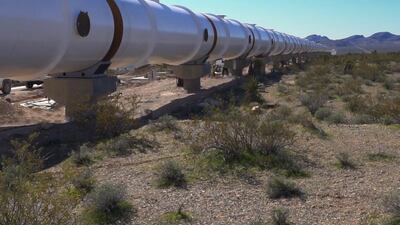Elon Musk's Hyperloop One company has completed the second phase of testing of the futuristic transport system, which is planned to feature magnetic levitation pods carrying people at up to 1,200kph in tubes either above or below ground.
The test held in Nevada this month appears to add weight to reports that there has been a change of mind for the SpaceX and Tesla chief executive officer. It comes after he revealed on Twitter last month that he had received “verbal government approval” to build a hyperloop capable of ferrying passengers between New York and Washington in 29 minutes. The tweet came as a shock to executives at the various start-ups racing to develop their own hyperloops based on Mr Musk’s specification after the rocket and electric car builder stated in 2013: “I don’t have any plan to execute because I must remain focused on SpaceX and Tesla." Several start-up chiefs initially expressed hope that he would simply use his Boring Company to dig the tunnels and perhaps choose one of them to create the physical infrastructure.
But a person close to Mr Musk said his plan is to build the entire thing, including the hyperloop system. He also holds a trademark for “Hyperloop” through SpaceX, which could be used to prevent other companies from using the term, according to US public records.
The billionaire’s unexpected entry into the hyperloop business could threaten the ambitions of three start-ups, which have raised about US$200 million combined from venture backers. “There’s probably a finite amount of capital willing to bet on this space - and bet against him,” said Jonathan Silver, the former loan programmes director at the US department of energy.
By the end of this summer, Mr Musk's company said on Thursday, Hyperloop One "will have spent more time testing a full-scale Hyperloop system than any other group in the world".
_______________
Read more:
Hyperloop rivalry hots up with HTT’s plan to build full-scale capsule
Hyperloop a step closer with Dutch full-scale testing centre
Airbus unveils its flying car designed to take driving airborne
_______________
"Last week, we shared the results of our second phase of trials, which deployed the complete XP-1 vehicle in the vacuum environment of our DevLoop tube. XP-1 is comprised of a carbon fibre aeroshell atop our levitating chassis, which includes the components for propulsion, levitation and guidance. During phase two testing we also reached the fastest recorded speed of any Hyperloop test pod, reaching a top speed of 310 kilometres per hour, or 192 mph.
"Since our ‘first flight’ was announced we’ve had a lot of interest globally in what we are building," it added. "We’ve culled our intelligence to address some of the top questions we’re getting about how Hyperloop works and share what we are learning during our tests."

